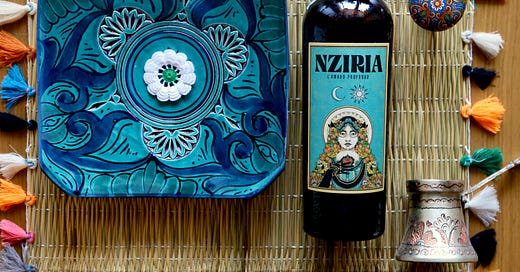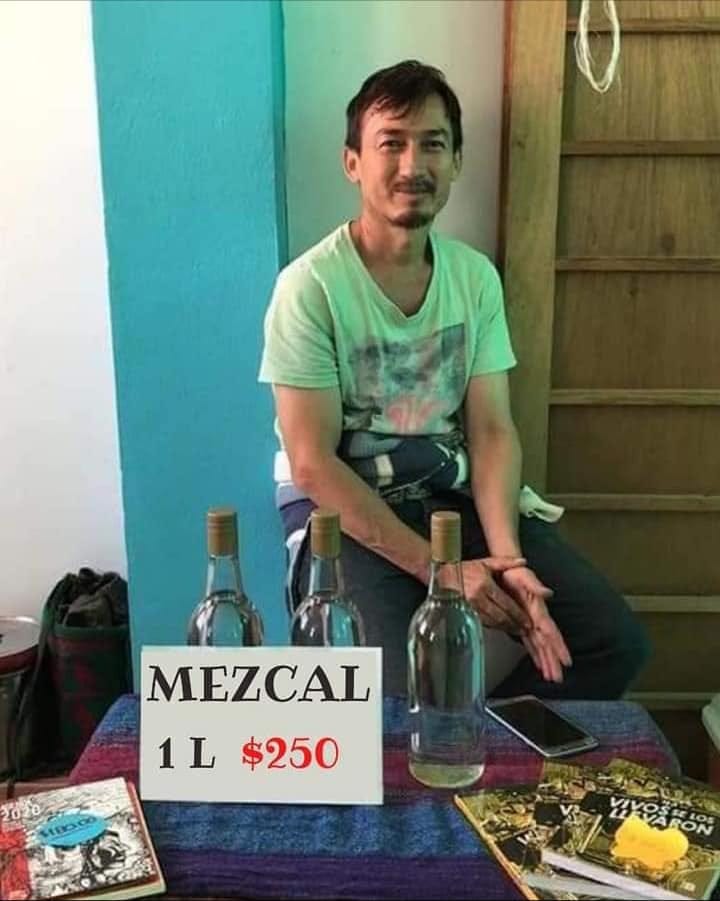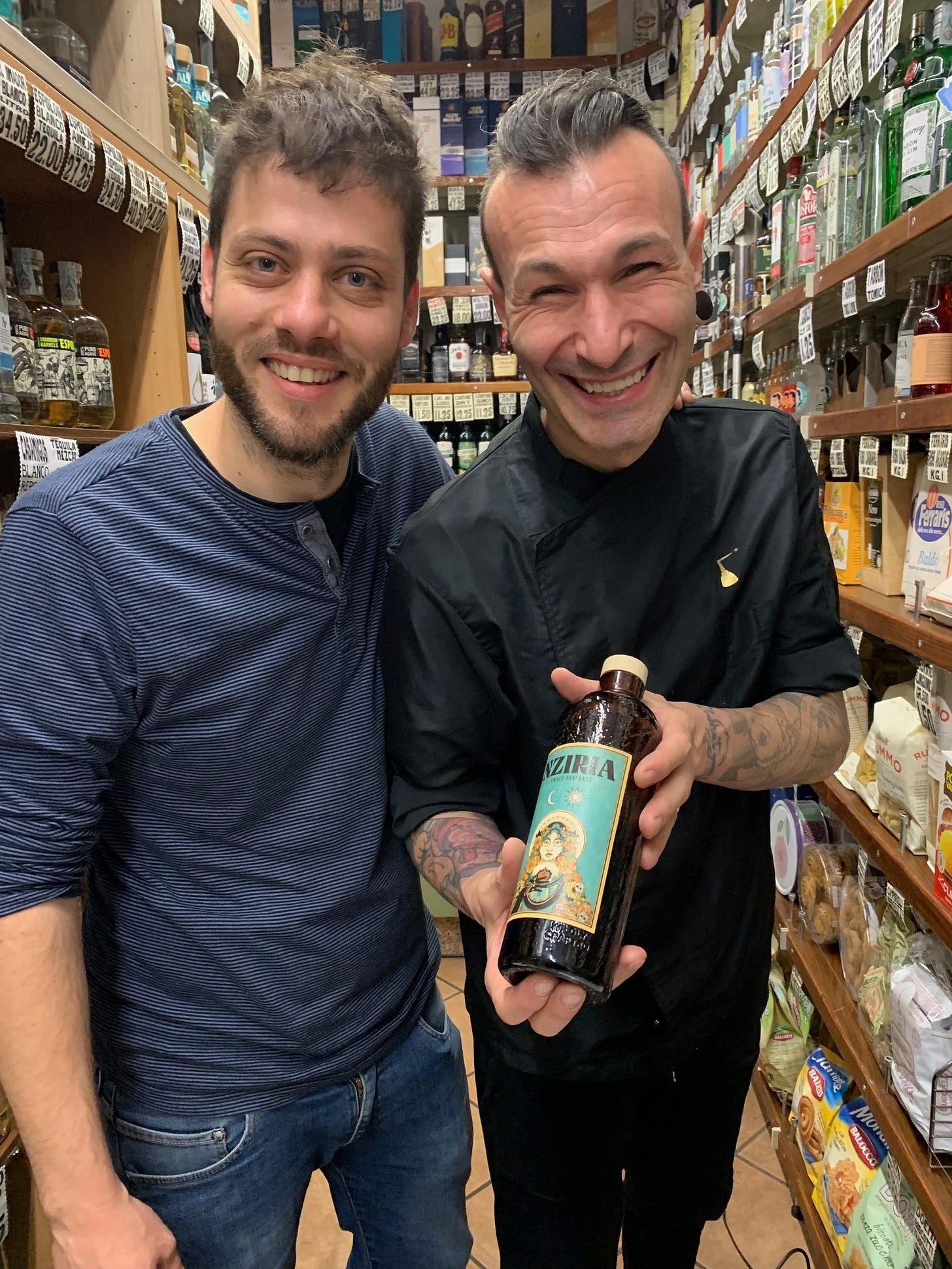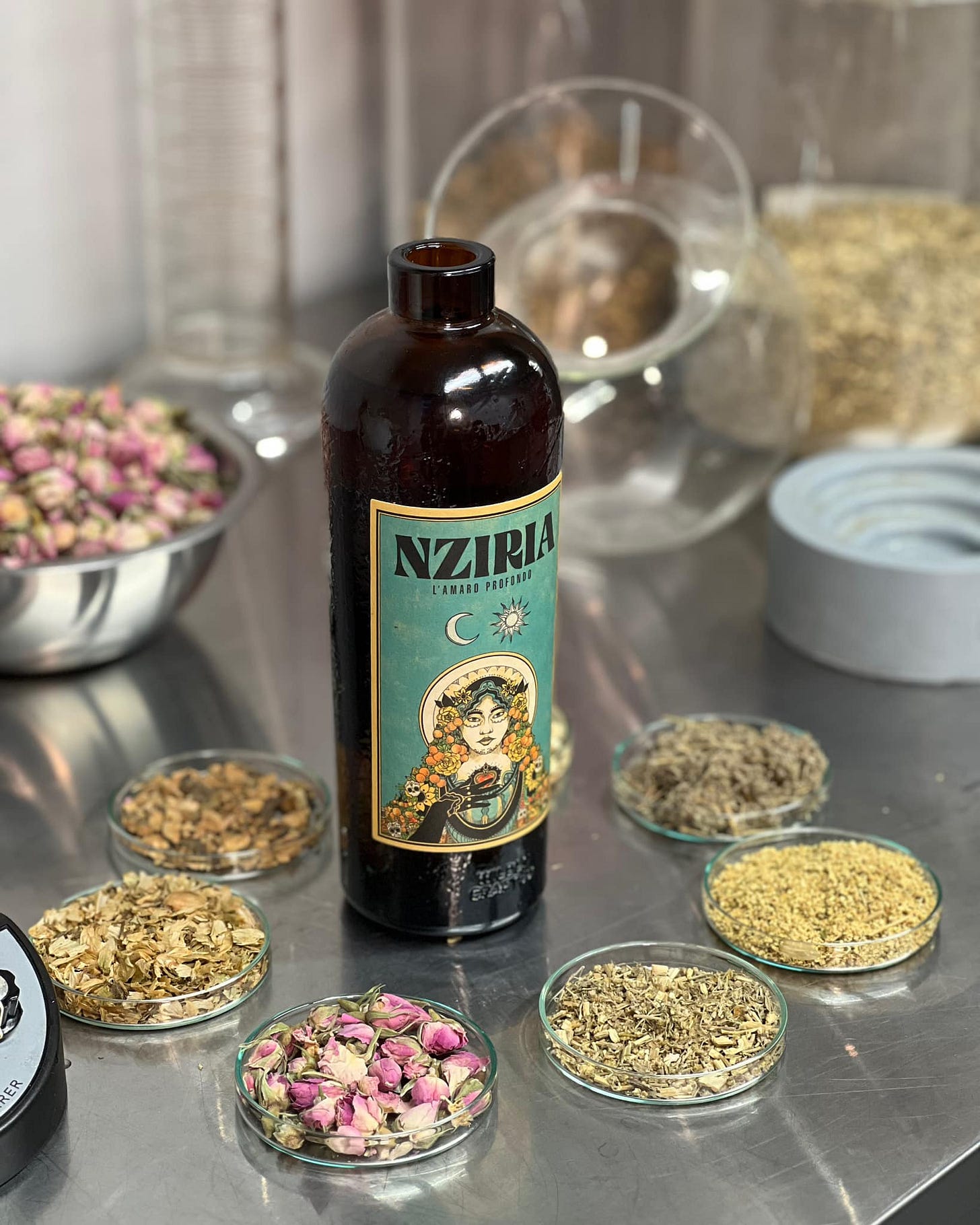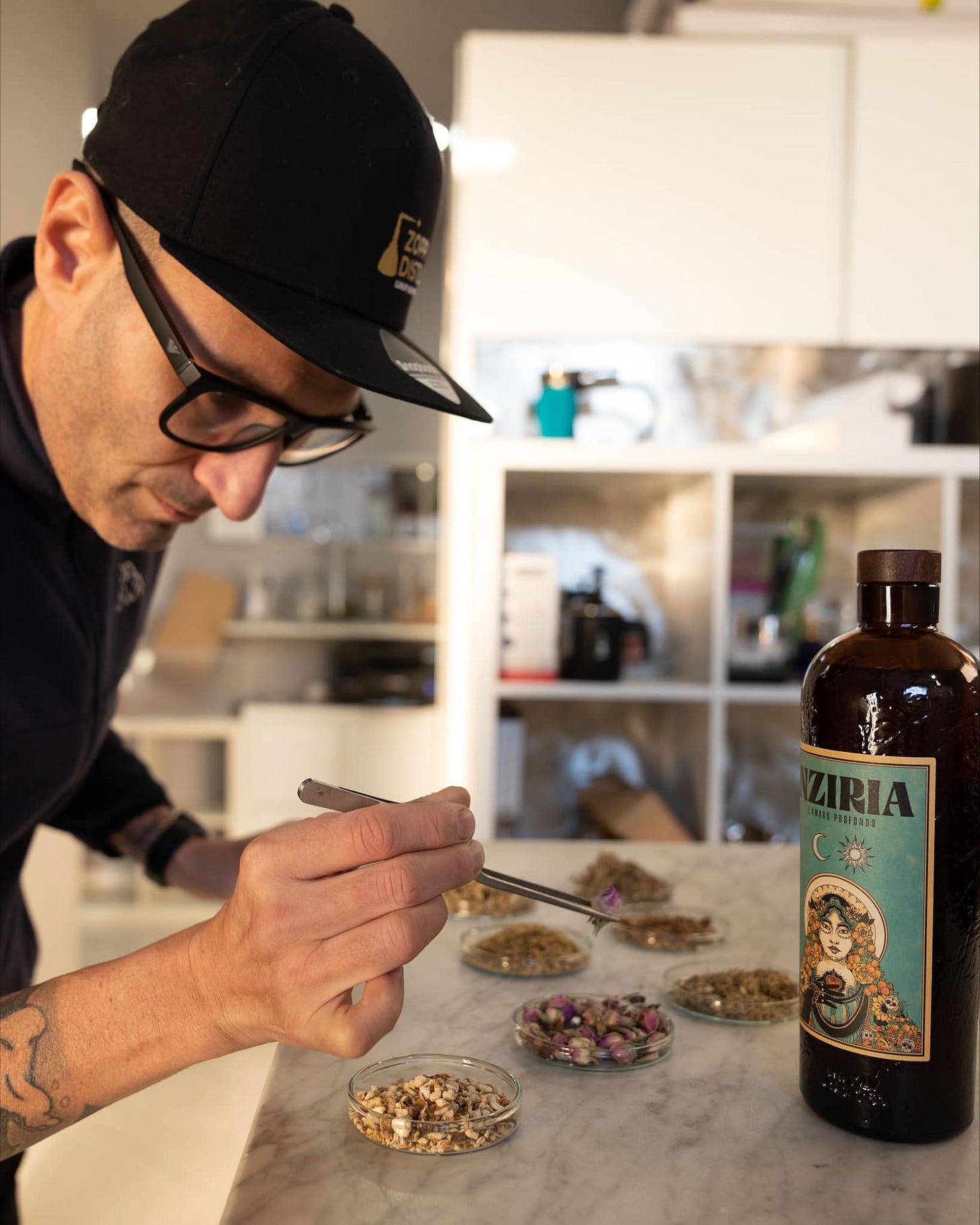S5E9. The liqueur of relentless souls
Amaro Nziria supports families and groups searching for missing persons along migration routes, from Central America to the Balkans. Each bottle becomes a tool for sharing "profound stories"
Dear reader,
welcome back to BarBalkans, the newsletter with blurred boundaries.
It is often said that every bottle holds a story waiting to be told.
Some bottles carry such profound power that they don’t even need to be uncorked. The glass becomes a symbol, the label a manifesto, and the liquid a nectar that brings people together.
These stories speak of humanity—of denied rights, disappearances, and untimely deaths. They tell of unrelenting resistance, both personal and collective, and the tireless pursuit of truth and justice.
They are as profound as the hearts of those searching for loved ones disappeared along migration routes, from Central America to the Balkans and North Africa. They are as inspiring as the dedication of those who stand beside them, often with creative and unexpected means.
These stories are as profound and bittersweet as an Amaro, the iconic Italian herbal liqueur. Like Amaro Nziria, which today opens our eyes to the possibilities that can be created around a single bottle.
Above all, it reveals the strength of those who refuse to give up—even in the face of the unthinkable.
There is a new way to support BarBalkans.
By donating a Bosnian coffee (or more) worth €1, you can help make this editorial project sustainable. You can also become a subscriber by donating a rakija for €5 per month.
Visit buymeacoffee.com/barbalkans and choose your favorite (virtual) drink!
Relentless spirits
To understand the origins of this social project and its connections to the Balkans, we must first take a step back in time and place.
“The story of Mario Vergara was a turning point,” explain Giacomo Donadio and Gianfranco Crua of Carovane Migranti, a collective from Turin that founded Spiriti Resistenti in 2022, alongside the Neapolitan publishing house Marotta & Cafiero.
On 5 July 2012, Tomas Vergara disappeared in Huitzuco, in the Mexican State of Guerrero. His brother, Mario, began searching for him, financing the effort by selling bottles of Mezcal from a local producer in Mexico City and organizing a team to search for the remains of their missing family members.
“His story struck a deep emotional chord.” From here, the idea emerged to create “a project that combined both a product and a narrative.”
The goal was to support Mario Vergara and others in similar situations. “Over ten years of experience with Carovane Migranti, we have met many mothers and relatives of people who disappeared along migratory routes.”
Beyond sharing these stories, a fundamental need remains: finding sustainable ways to fund their efforts—to continue the search, organize trips, seek legal assistance, and more.
“We aimed to expand the audience” for the stories that were being shared. The people listening were then invited to lend their skills to a project that “thanks to the convergence of different experiences, became a bottle of Amaro,” Donadio and Crua explain.
One of the key professionals involved is Dennis Zoppi, a renowned mixologist who runs a micro-distillery in Turin. “Moved by the story of Mario and the Honduran mothers, he decided to help us craft the recipe for the liqueur.”
This marked the beginning of Spiriti Resistenti as a company in April 2022, and with it, the creation of the Amaro Profondo.
Read also: S2E24. Human bridges
The search for the right name for the liqueur was far from straightforward.
“Gianfranco and I had initially considered something like a neologism, such as ‘Ancestralico,’ which evoked the word ‘ancestral’ and the Greek myth of the hero Alico, tied to the theme of searching for kidnapped people,” Donadio recalls.
Then Rosario Esposito La Rossa from Marotta & Cafiero suggested the name ‘Nziria.’
“‘Nziria’ in Neapolitan means whim or obstinacy”—words that perfectly align with the project’s concept and reflect the collaboration between the Neapolitan and Turin teams.
The product itself is instantly recognizable and meticulously designed. With illustrator Vincenzo Del Vecchio, “we spent a lot of time perfecting the label,” which features the Neapolitan Madonna of the Mandarins, her hands adorned with henna as a tribute to the Tunisian mothers, surrounded by small skulls that draw from Central American traditions.
The bottle itself also tells a story, with details that “might be missed” by the casual observer but become clear to a more attentive touch. “The rough, scratched texture of the glass evokes the scars of an excavation,” symbolizing the ongoing search for missing persons.
In essence, as Donadio and Crua of Carovane Migranti point out, Amaro Nziria can be described in three words: “Deep, intense, sincere.”
“These words speak to the depth of experience, suffering, and the relentless effort of searching.” At the same time, the bottle becomes “a means to share often untold stories, an extraordinary tool for telling and connecting.”
Read also: S2E22. Ulula in the Forest of Bihać
This is just the beginning
Amaro Nziria’s mission is to support people and organizations on the ground, from Central America to the Balkans and beyond.
“The donations come from the space we have created for migrant families to represent themselves,” Donadio and Crua explain. “Every person who has died or disappeared has a family behind them—whether they are searching for their loved ones or have been left behind.”
To date, three projects have been supported.
The initiative of Ana Enamorado, a Honduran woman who lost her son Oscar in 2010 in Mexico while he was on his way to the United States. She has since built a network of Central American mothers who are searching for their missing children.
The project of Ruben Figueroa, who–in response to his brother’s disappearance–created a program to support Central American families living in the United States who are searching for their loved ones.
Finally, the work of Sabina Talovic. Through her ‘Bona Fide’ centre in Pljevlja (Montenegro), she has opened her home to thousands people traveling along the Balkan route—primarily women and children.
Read also: S2E34. Healing ajvar
“Supporting a beneficiary by sharing their story and what has been financed is essential,” Donadio and Crua emphasize. “It helps people understand that, due to the inactivity of institutions, in some areas families, movements, and grassroots organizations are stepping in to fill the gap.”
One such case is Socorro Gil Guzmán, who founded a collective of mothers and relatives of missing people in Mexico. She is currently receiving financial support from Spiriti Resistenti to purchase a drone and a molecular dog to help detect human burials.
After producing approximately 3,000 bottles of Amaro Nziria since autumn 2022–including a special edition with the red label “They tried to bury us, but they didn't know we were seeds”–Spiriti Resistenti is now focused on the future.
From this very quote, four artists have donated four unique illustrations, which are available for purchase to support Amaro Nziria’s ongoing initiatives.
“It would also be great to create a graphic novel literary prize,” Donadio reveals for the first time. Just as the Strega liqueur gave birth to Italy’s most prestigious literary award–the Premio Strega–“Amaro Nziria could establish a jury and launch a militant literary prize.”
On the literary front, another idea being explored is the book in the bottle concept. “A bottle of Amaro Nziria can be sold alongside an empty bottle containing a written message inside,” Crua explains.
This idea, which originates from Naples, could also align with the goal of “connecting mothers from Scampia neighborhood–many of whom have children in jail–with mothers from Central America or the Balkans, whose children have disappeared.”
Read also: S2E17. The Balkans in Naples
Finally, other plans could include the creation of non-alcoholic products that respect the religious traditions of certain communities, such as the Tunisian mothers. “We have known them for ten years, but offering them financial support through the sale of an alcoholic product seemed complicated,” Donadio and Crua say.
Coffee could become a unifying product. “We have connections with mothers in Guatemala who produce coffee, and in Italy, there are groups importing Zapatista coffee. We could also consider involving Bosnian coffee producers.”
Donadio envisions “a blend of two distinct coffees—one from Central America and one from Bosnia—perhaps even with a džezva and instructions on how to prepare Bosnian coffee.”
From Mexico to the Balkan Route
While geographically distant, Central America and the Balkan region share several points of contact when it comes to human rights violations.
As Donadio and Crua of Carovane Migranti recall, “even along the Balkan route, people disappear, and families begin searching for them, while criminal networks take control of the passages.” These mechanisms, they explain, “are similar at every latitude, in Central America, they simply began several years earlier.”
In short, despite the differences, “the Balkans are perhaps the region that most closely resembles Mexico when we talk about recent migration routes.”
This is why the work of grassroots organizations is crucial, not only in Central America but also in the Balkans, as demonstrated by the project funded by Spiriti Resistenti in Montenegro.
Read also: XXXI. One and many Lipa. The shame of Europe
“We heard about Spiriti Resistenti from Italian friends and activists who connected us,” says Sabina Talović, founder of ‘Bona Fide’ centre in Pljevlja, speaking with BarBalkans.
“We are a feminist and anti-militarist organization, aiming at promoting and protecting human rights, gender equality, and lasting peace,” she explains. ‘Bona Fide’ focuses also on people traveling along the Balkan route to reach Central and Northern European countries.
“Over the past five years, the centre has provided support to more than 17,000 migrant people,” Talović continues, stressing the “very difficult and complex” conditions faced by people traveling along this route.
This is also the case of Montenegro, a country rarely mentioned in discussions about the Balkan route. “The situation is particularly harsh in Pljevlja, where we live and work,” Talović highlights, noting the added challenge of “the hostility of citizens towards migrant people.”
It does not help the fact that “there are no strategies or systemic solutions at the state level,” nor that her town is led by a mayor from New Serbian Democracy, a nationalist far-right party.
As a result, in Pljevlja, “activists supporting migrant people are under great pressure,” facing particularly difficult conditions. “We have even been physically assaulted,” Talović denounces.
This is why donations supported by projects like Amaro Nziria are so vital: “They guarantee our survival, the continuation of our work, and support for people on the move.”
Pit stop. Sittin’ at the BarBalkans
We have reached the end of this piece of the road.
Without a doubt, today at our bar, the BarBalkans, there is only one choice: Amaro Nziria.
“This is not an extreme Amaro. It strikes a perfect balance, with a mix of astringent and bitter notes, complemented by a smooth sweetness and roundness. The finish leaves a pleasantly bitter aftertaste,” Donadio explains. Together with Zoppi, he created and perfected the recipe.
The inspiration to combine Mediterranean aromas with those from Central America led to the extraction of 17 herbs and spices.
On the first sip, you will notice rhubarb, cinchona, gentian, and artemisia. Thyme and yarrow introduce a subtle astringency, which blends with marjoram and coriander. At the end, a bittersweet persistence is enhanced by refreshing floral notes of rose, hops, elderflower, and jasmine, alongside the bright citrus essence of orange and grapefruit.
This is Amaro Nziria—far more than just a story at the bottom of the bottle.
Let’s continue BarBalkans journey. We will meet again in two weeks, for the 10th stop of this season.
A big hug and have a good journey!
If you have a proposal for a Balkan-themed article, interview or report, please send it to redazione@barbalcani.eu. External original contributions will be published in the Open Bar section.
The support of readers who every day gives strength to this project–reading and sharing our articles–is also essential to keep BarBalkans newsletter free for everyone.
Behind every original product comes an investment of time, energy and dedication. With your support BarBalkans will be able to elaborate new ideas, interviews and collaborations.
Every second Wednesday of the month you will receive a monthly article-podcast on the Yugoslav Wars, to find out what was happening in the Balkans–right in that month–30 years ago.
You can listen to the preview of The Yugoslav Wars every month on Spreaker and Spotify.
If you no longer want to receive all BarBalkans newsletters (the biweekly one in English and Italian, Open Bar external contributions, the monthly podcast The Yugoslav Wars for subscribers), you can manage your preferences through Account settings.
There is no need to unsubscribe from all the newsletters, if you think you are receiving too many emails from BarBalkans. Just select the products you prefer!

